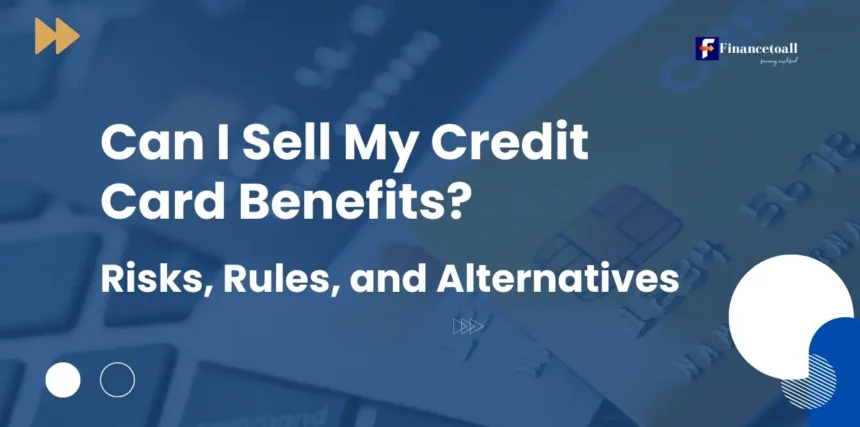Can I sell my credit card benefits? It is a question many people ask when they see the value of their rewards, travel perks, or cashback offers. After all, these benefits can feel like untapped cash or opportunities.
Credit card benefits, like rewards points, cashback, and exclusive travel perks, are designed to enhance the value of your spending. For some, the idea of converting these perks into cash by selling them seems like a smart move. Whether it’s selling airline miles or passing on travel discounts, the potential value might appear too good to ignore.
Understanding Credit Card Benefits
Credit card benefits are rewards and perks offered by issuers to encourage spending and customer loyalty. These benefits come in various forms, ranging from rewards points and cashback to exclusive travel perks and retail advantages. They are designed to add value to your purchases and improve your overall financial experience.
Types of Credit Card Benefits
1. Rewards Points and Miles
- Rewards points are earned for every dollar spent using your credit card. These points can often be redeemed for travel, merchandise, or gift cards.
- Miles are specific to travel-focused credit cards and can be used for flights, hotel stays, and other travel-related expenses.
- Example: Spend $1,000 on a travel card and earn 10,000 miles that cover a free domestic flight.
2. Cashback
- Cashback is a straightforward benefit where a percentage of your spending is returned as a cash reward.
- Ideal for those who prefer flexibility, cashback can often be applied as a statement credit or direct deposit.
- Example: Earn 2% cashback on grocery and gas purchases, saving money on everyday expenses.
3. Travel Perks
- Travel-focused credit cards offer exclusive benefits like:
- Complimentary airport lounge access for a relaxing travel experience.
- Free hotel stays through loyalty programs or partner networks.
- Travel insurance, including trip cancellation coverage and lost baggage protection.
- These perks make travel more comfortable and cost-effective.
4. Retail Benefits
- Retail benefits include features like purchase protection, extended warranties, and access to special discounts or offers.
- Purchase protection covers items you buy against theft or accidental damage for a certain period.
- Example: Buy a smartphone with your credit card and enjoy an additional year of warranty coverage.
Why Credit Card Benefits Are Valuable to Consumers
Credit card benefits add tangible and intangible value to your spending. Here’s why they matter:
- Cost Savings: Cashback and discounts reduce your out-of-pocket expenses.
- Enhanced Experiences: Travel perks make trips more luxurious and hassle-free.
- Flexibility: Rewards points and miles can be redeemed in ways that suit your needs, whether for travel, shopping, or bill credits.
- Financial Protection: Features like purchase protection and extended warranties give you peace of mind when making big-ticket purchases.
Understanding these benefits helps you make informed decisions about how to use your credit card strategically to maximize value. However, questions about transferring or selling these perks often arise, which brings us to the next section.
Can You Legally Sell Credit Card Benefits?
The short answer is no—most credit card issuers explicitly prohibit the sale of benefits. Whether it’s rewards points, travel perks, or cashback, these benefits are usually non-transferable and cannot be sold to others without violating the terms and conditions of your credit card agreement.
Why Selling Credit Card Benefits Is Prohibited
Credit card companies design their reward systems to benefit the cardholder, not for resale or transfer to others. Here’s why selling is not allowed:
- Protecting Program Integrity: Allowing benefits to be sold could undermine the value of the rewards program and lead to abuse.
- Preventing Fraud: Selling benefits opens the door to fraudulent activities, like fake accounts or unauthorized transactions.
- Ensuring Exclusivity: Many perks, such as lounge access or travel insurance, are tied directly to the cardholder’s identity.
Terms and Conditions That Prohibit Selling
Almost all credit card agreements include clauses that restrict the transfer or sale of rewards. For instance:
- Non-Transferability Clause: Rewards points and benefits are often limited to the account holder and authorized users.
- Forfeiture Policies: Issuers may cancel your points or close your account if they detect misuse or unauthorized sales.
These rules ensure that the program benefits remain fair and equitable for all users.
Common Violations and How Issuers Monitor Misuse
Credit card issuers use sophisticated systems to monitor unusual activity and enforce their terms. Some common violations include:
- Selling Points or Miles Online: Listing rewards for sale on third-party websites or forums is a clear breach of policy.
- Unauthorized Benefit Transfers: Sharing lounge access or travel perks with strangers without permission from the issuer.
- Fraudulent Redemption: Using fake accounts or false information to exploit rewards programs.
Issuers can flag suspicious activity through tracking tools, and if violations are detected, they may:
- Cancel the transaction or redeemable rewards.
- Close the account and revoke all remaining benefits.
- Impose legal or financial penalties for fraudulent actions.
Why Selling Credit Card Benefits Is Not Allowed
Selling credit card benefits is explicitly prohibited by issuers for several critical reasons. These rules are in place to ensure fairness, prevent abuse, and protect the integrity of rewards programs. Let’s explore why selling these perks isn’t allowed and the risks it poses to both issuers and cardholders.
1. Fraud Prevention and System Abuse
- Encourages Fraudulent Activity: Selling benefits creates opportunities for scammers to exploit rewards systems, such as by creating fake accounts or engaging in identity theft.
- Undermines Security: Allowing benefits to be traded or sold compromises the security of the program, making it harder for issuers to ensure that only legitimate cardholders redeem rewards.
- Example: A cardholder selling airline miles might unknowingly deal with a fraudster who uses stolen credit card information, leading to legal complications for both parties.
2. Maintaining Program Integrity
- Ensuring Fair Use: Rewards programs are designed to provide value to the cardholder as a direct benefit of their spending. Selling these benefits distorts this purpose.
- Protecting Exclusivity: Many perks, like priority boarding or lounge access, are meant to be exclusive to the cardholder. Selling them reduces their value and diminishes the experience for legitimate users.
- Preventing Market Saturation: If benefits like points or miles are widely sold, it could lead to inflation within the rewards system, where the value of points decreases for everyone.
3. Risks to Issuers and How They Prevent Resale
Credit card issuers face significant risks if benefits are resold:
- Financial Losses: Unauthorized sales can lead to over-redemption of rewards, increasing the program’s operational costs.
- Brand Reputation Damage: Misuse of benefits can harm the issuer’s reputation, making the program less appealing to new customers.
- Operational Strain: Handling disputes and tracking fraudulent sales creates additional burdens for issuers.
To mitigate these risks, issuers employ the following strategies:
- Monitoring Account Activity: Advanced algorithms track unusual transactions or redemption patterns to identify potential misuse.
- Enforcing Strict Terms: Issuers reserve the right to revoke points, cancel accounts, and take legal action against those found violating their policies.
- Education and Warnings: Many companies proactively educate users about the risks and penalties associated with selling benefits.
Risks of Attempting to Sell Credit Card Benefits
Selling your credit card benefits may seem like an easy way to turn perks into cash, but it comes with significant risks that far outweigh any short-term gains. Credit card issuers have strict rules against such practices, and violating these terms can result in severe consequences. Here’s a closer look at the potential dangers and real-world examples of what could go wrong.
1. Breach of Terms and Conditions
Every credit card agreement includes terms that prohibit the resale or unauthorized transfer of benefits. Attempting to sell your perks directly violates these terms, leading to:
- Forfeiture of Rewards: All accumulated points, miles, or cashback may be revoked immediately if the issuer detects unauthorized activity.
- Card Cancellation or Account Suspension: Your credit card issuer may cancel your account or suspend it indefinitely, restricting access to credit and benefits.
- Legal or Financial Repercussions: In extreme cases, selling benefits could be classified as fraud, leading to fines or legal action.
2. Examples of What Could Go Wrong
Selling Points on Unauthorized Platforms
Some individuals attempt to sell rewards points or miles on third-party websites or forums. While this may seem like a convenient way to convert points into cash, it’s fraught with risks:
- Issuer Detection: Credit card companies use advanced tracking to identify unusual point transfers, such as bulk redemptions to unfamiliar accounts.
- Buyer Fraud: The person purchasing your points could be a scammer, leaving you without money and facing potential disputes with the issuer.
- Forfeited Points: Once flagged, the issuer may void the transaction and seize all your accumulated points.
Transferring Perks to Strangers
Sharing travel perks, such as lounge access or companion tickets, with strangers for a fee can also backfire:
- Access Denied: Many benefits, like lounge access, require verification of the cardholder’s identity. If the stranger cannot prove their eligibility, the perk may be invalidated.
- Issuer Penalties: Unauthorized transfers can result in the loss of the perk and possible sanctions against your account.
3. Why the Risks Aren’t Worth It
While the idea of selling benefits may seem appealing, the potential consequences can cause long-term damage:
- Credit Score Impact: Account suspension or closure could negatively affect your credit score, making it harder to qualify for loans or new credit cards.
- Lost Trust with Issuers: Violating terms can result in permanent bans from the issuer’s programs, limiting your access to future rewards.
Alternatives to Selling Credit Card Benefits
While selling credit card benefits is prohibited, there are many legitimate ways to make the most of your rewards without breaking the rules. These alternatives allow you to unlock the value of your perks while staying within the guidelines set by issuers. Here are some practical and legal options to consider:
1. Gift or Transfer Options
Many rewards programs allow you to share your points or miles with family members or friends, offering a simple and legal way to pass on the benefits.
- Family Transfers: Some issuers enable direct point transfers to accounts of family members, making it easier to combine rewards for shared goals like a vacation.
- Authorized User Benefits: Adding a trusted person as an authorized user on your account allows them to enjoy certain perks, such as lounge access or discounts, without violating terms.
- Examples: Programs like Chase Ultimate Rewards and American Airlines AAdvantage allow point sharing with eligible individuals.
Tip: Always check your issuer’s specific policies for transfer limits or fees to avoid unexpected costs.
2. Charitable Donations
If you’re not planning to use your rewards, donating them to a cause you care about is a meaningful option.
- How It Works: Many credit card issuers and loyalty programs partner with charities, allowing you to donate points or miles directly through their platform.
- Impact: Your rewards can fund flights for those in need, support disaster relief efforts, or contribute to nonprofit organizations.
- Examples: American Express Membership Rewards and Delta SkyMiles offer direct donation options to a variety of charities.
Tip: Donations are often tax-deductible, so consult a tax professional to determine if you can claim the deduction.
3. Maximize Rewards Usage
To get the most value out of your credit card benefits, focus on strategic redemptions. Here are some tips:
Redeem for High-Value Travel Bookings
- Use points or miles for premium travel experiences, such as first-class flights or luxury hotel stays, to maximize their worth.
- Look for promotional offers where points go further, like discounted award travel or limited-time deals.
Utilize Cashback for Everyday Expenses
- Redeem cashback rewards for statement credits or direct deposits to reduce your monthly expenses.
- Some cards offer bonus cashback for specific categories, such as groceries or dining, which can help you save even more.
Explore Issuer Portals
- Many issuers offer special deals through their rewards portals, such as discounts on merchandise, gift cards, or exclusive experiences.
- Example: The Chase Ultimate Rewards portal often provides up to 50% more value when redeeming points for travel.
4. Combine Strategies for Maximum Benefit
You don’t have to choose just one option—mix and match strategies to suit your goals. For instance:
- Donate unused points while transferring others to a family member.
- Redeem cashback for daily needs while saving travel perks for a special vacation.
Tips for Maximizing Credit Card Benefits
To fully enjoy the perks of your credit card, it’s essential to have a strategy for using them effectively. By understanding your card’s reward structure and staying organized, you can maximize the value of your benefits and ensure you’re not leaving money or perks on the table. Here are actionable tips to help you make the most of your credit card rewards.
1. Align Spending Habits with Your Card’s Reward Structure
- Focus on Bonus Categories: Many cards offer higher rewards in specific categories, such as dining, travel, groceries, or gas. Prioritize spending in these areas to maximize your rewards.
- Example: A card offering 5% cashback on groceries can significantly increase your savings if you use it for weekly shopping.
- Specialized Cards for Specific Needs: If your spending varies, consider using multiple cards tailored to different categories, such as one for travel and another for everyday expenses.
Tip: Review your spending habits regularly and adjust how you use your card to match its strongest reward categories.
2. Keep Track of Expiration Dates for Rewards and Perks
- Rewards Expiration: Some points or miles may expire if unused within a specific timeframe. Set reminders to redeem them before they’re lost.
- Perk Deadlines: Benefits like free travel credits or annual statement credits often reset annually or quarterly. Use these perks before they expire to avoid losing value.
- Example: Use your card’s annual travel credit for flight or hotel bookings well before the renewal date.
Tip: Use a budgeting app or calendar to track important dates for rewards and perks.
3. Use Issuer Portals for Exclusive Deals or Bonuses
- Maximize Point Value: Many credit card issuers offer higher redemption rates when you book travel, shop, or redeem points through their portals.
- Example: Chase Ultimate Rewards gives up to 50% more value for travel redemptions using their platform.
- Exclusive Discounts: Issuers often provide access to special promotions, such as discounted merchandise, gift cards, or limited-time offers.
- Partner Offers: Look for partnerships between issuers and merchants for additional savings or bonus points.
Tip: Check your credit card’s rewards portal regularly for updated offers and seasonal promotions.
4. Upgrade or Switch Cards if Current Benefits Don’t Suit Your Needs
- Evaluate Your Card Annually: Assess whether your credit card still aligns with your lifestyle and spending habits. If it doesn’t, consider upgrading or switching to a more suitable option.
- Example: If you’ve stopped traveling frequently, switch from a travel rewards card to a cashback card for better value.
- Leverage Retention Offers: Before canceling or switching, call your issuer to ask about retention offers, which might include additional perks or reduced annual fees to keep you as a customer.
Tip: Research alternatives to find cards that offer higher rewards in the categories where you spend the most.
Conclusion
Selling credit card benefits may seem like an attractive way to monetize your perks, but it’s not worth the risk. Credit card issuers prohibit the sale of rewards points, travel perks, or cashback, and violating their terms can lead to severe consequences, including forfeiture of benefits, account closure, and even legal repercussions.
Instead of attempting to sell your benefits, focus on legitimate ways to maximize their value. Gift or transfer points to eligible family members, donate rewards to a charity or redeem them for high-value travel bookings and cashback.
Frequently Asked Questions About Selling Credit Card Benefits
1. Can I sell my rewards points legally?
No, selling your rewards points is not legal according to the terms and conditions of most credit card issuers. These points are typically non-transferable and intended for personal use or redemption. Selling them could result in forfeiture of your points, account closure, or legal action.
2. What happens if I sell my credit card benefits and get caught?
If you sell your credit card benefits and the issuer discovers it, you may face the following consequences:
Loss of Rewards: All accumulated points, miles, or perks could be forfeited.
Account Closure: Your credit card account may be suspended or permanently closed.
Legal Repercussions: In severe cases, especially if fraud is involved, you might face fines or legal penalties.
3. Are there any credit cards that allow transferable benefits?
Yes, some credit cards allow you to transfer benefits under specific conditions:
Rewards Points: Cards like Chase Sapphire Preferred, American Express Membership Rewards, and Citi ThankYou Rewards let you transfer points to travel partners or eligible family members.
Authorized User Perks: Adding an authorized user to your account allows them to enjoy certain benefits, such as airport lounge access or travel credits. Always check the issuer’s rules for eligibility and limitations.
4. Can I share my lounge access with someone else?
It depends on your credit card’s terms:
Some premium cards, like the Platinum Card® from American Express, allow you to bring guests into airport lounges for free or for a fee.
Other cards strictly limit lounge access to the primary cardholder or authorized users. Selling lounge access, however, is prohibited and could result in account penalties.
5. Why is selling credit card benefits prohibited?
Credit card issuers prohibit selling benefits to:
Prevent fraud and misuse of the rewards program.
Maintain the integrity and exclusivity of the perks.
Protect the fairness of the program for all cardholders. Selling benefits violates your agreement with the issuer and compromises the security of the rewards system.
6. What are some legitimate alternatives to selling credit card benefits?
If you’re looking to maximize your rewards, consider these options:
Gifting Points: Transfer points or miles to eligible family members or friends.
Donating Rewards: Many issuers allow you to donate points or miles to charitable organizations.
Strategic Redemption: Redeem your benefits for high-value travel bookings, cashback, or exclusive deals through issuer portals.
7. How can I maximize my credit card benefits?
To get the most out of your credit card perks:
Align your spending with your card’s reward categories (e.g., dining, travel, or groceries).
Track expiration dates for rewards and perks to avoid losing value.
Use your card issuer’s rewards portal for exclusive deals and higher redemption values.
Upgrade or switch to a card that better suits your spending habits if necessary.








